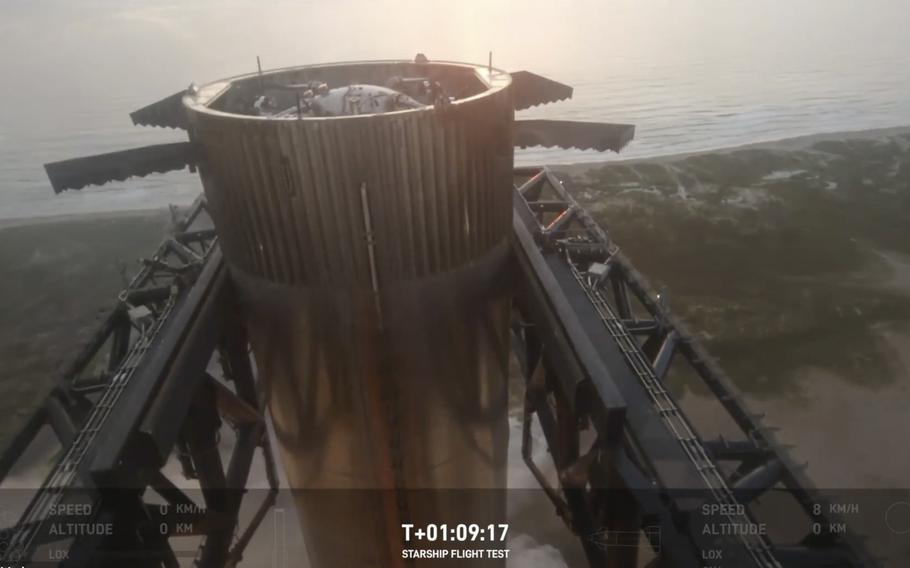
SpaceX’s mega rocket booster returns to the launch pad to be captured during a test flight Sunday, Oct. 13, 2024, in Boca Chica, Texas. (SpaceX via AP)
“The Eagle has landed.”
Astronaut Neil Armstrong transmitted that striking statement back to Earth on July 20, 1969, from the surface of the moon. President John F. Kennedy made the dramatic pledge in 1961 to land a man on the moon before the end of that decade — and return him safely to Earth, the president always carefully added.
On Oct. 13, Elon Musk and SpaceX Corp. made history by successfully launching and recovering the largest rocket ever made, the Starship Super Heavy. The enormous booster after disengagement was also recovered in a spectacular feat of engineering.
On the morning of June 4, 2022, the company Blue Origin transported a group of five passengers 62 miles above Earth, to the edge of space. Jeff Bezos, founder of Blue Origin, and Amazon, is one of a number of business entrepreneurs pursuing ventures in space, once the exclusive province of governments.
Space business is growing rapidly. In April 2021, NASA announced SpaceX would construct a lander to take astronauts to the moon for the first time since the last Apollo mission in 1972.
Kennedy fostered the strong foundation of business-government partnership in space exploration through his 1962 legislation on communication satellites.
We automatically recognize JFK’s role in launching the mammoth moon project. Collectively, we almost universally ignore his leadership in creating the global satellite-based communications network that is vital to how we communicate, work and live today.
President Dwight Eisenhower initiated the satellite communications effort. Predictably, he emphasized established communications corporations. This reflected his fundamental faith in business executives, along with Republican Party preferences, philosophical and practical.
The Kennedy administration largely continued that course. The new proposed COMSAT (Communications Satellite) Corp. was privately chartered, not a government agency.
Intense controversy followed, with angry protests within Kennedy’s Democratic Party about handouts and welfare for big business.
Reflecting party dynamics of that time, conservative but populist Southern plus Western Democrats were among the most outraged.
Alleged favoritism to big business was highly controversial two decades after the Great Depression.
Nonetheless, Congress overwhelmingly approved legislation creating COMSAT. This in turn facilitated rapidly growing collaboration among major communications corporations and a vast array of other firms in creating the pervasive global satellite systems of today.
As one example, in 1973 a consortium of major commercial banks agreed to transfer funds electronically, opening the door to today’s enormous fast-moving global banking system. The initial SWIFT (Society for Worldwide Interbank Financial Telecommunication) system, initiated in 1973, has operated since 1977. Over the decades, satellite along with land-based systems have become integral to vast voice and data communications of all kinds.
Musk and associates pursue revolution in transportation. Bezos and associates build stratospheric levels of e-commerce. They personify our nation’s historic entrepreneurial daring.
Beyond personalities, sustained space exploration reflects our history of business-government partnerships. Give JFK credit for appreciating that in launching us into space, long-term.
Eisenhower and Kennedy also are similar in resisting the militarization of space. President Lyndon Johnson in particular pursued this goal, successfully. By contrast, President Donald Trump emphasized developing military activities in outer space, represented by the new Space Force.
This underscores the conflicting interests and considerations, practical and ethical, that must be included in any responsible evaluation of the most appropriate roles related to our U.S. military in outer space. Russia’s moves make competition, though not necessarily confrontation, in that realm unavoidable today.
The International Space Station involves Russia and the United States, plus Canada, Europe and Japan. Despite setbacks, space exploration does foster international cooperation.
Learn more: Walter McDougall, “The Heavens and the Earth — A Political History of the Space Age” (Johns Hopkins University).
Arthur I. Cyr is author of “After the Cold War” and other books.